New Police Story (2004, Dir. Benny Chan):
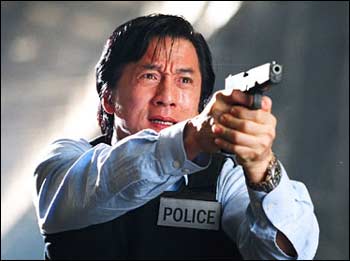 Bless Jackie Chan. Three decades of bone-crunching acrobatics, mugging for the cameras, and good-natured hijinks, and he’s still at it. Never mind that he pulled off his one neat trick — updating the goofy martial arts template he perfected in period pieces like Drunken Master for the modern world in the original Police Story — 20 years ago. Since then, he’s indulged in all-star Hong Kong productions, B-star Hollywood schlock, and even tried his hand at producing (check out the underrated 1988 film Rouge). While Hong Kong cinema was being co-opted by Hollywood, and undergoing its own convulsions (Wong Kar-Wai and Wong Jing, anyone?), Jackie stuck to his quaintly old-fashioned virtues: kung fu as dance number, lumbering connect-the-dots plots, appallingly broad/bad acting, masochistic pratfalls interjected as show stoppers. And now, over 50 years old and faced with his own irrelevance (does anyone really want to see Rush Hour 3?), he has returned to Hong Kong, and the series that cemented his international fame.
Bless Jackie Chan. Three decades of bone-crunching acrobatics, mugging for the cameras, and good-natured hijinks, and he’s still at it. Never mind that he pulled off his one neat trick — updating the goofy martial arts template he perfected in period pieces like Drunken Master for the modern world in the original Police Story — 20 years ago. Since then, he’s indulged in all-star Hong Kong productions, B-star Hollywood schlock, and even tried his hand at producing (check out the underrated 1988 film Rouge). While Hong Kong cinema was being co-opted by Hollywood, and undergoing its own convulsions (Wong Kar-Wai and Wong Jing, anyone?), Jackie stuck to his quaintly old-fashioned virtues: kung fu as dance number, lumbering connect-the-dots plots, appallingly broad/bad acting, masochistic pratfalls interjected as show stoppers. And now, over 50 years old and faced with his own irrelevance (does anyone really want to see Rush Hour 3?), he has returned to Hong Kong, and the series that cemented his international fame.
As with any formulaic genre venture that has earned a place in our hearts (look no further, Mr. Bond), we approach a Jackie Chan film with different criteria. Given the desultory lows of his recent American output, expectations were no doubt running high, but what were these expectations, exactly? Fight scenes lasting for 10 minutes? The usual indifference towards plot and character? Yet another death-defying stunt? How much is enough?
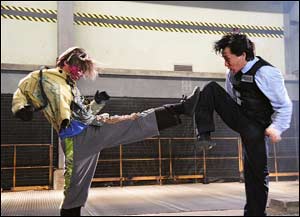 New Police Story, as the title suggests, doesn’t quite go home again — instead, it cannily updates the tried-and-true formula with what’s hot in Hong Kong, circa 2004. Thus, we have an invasion of Generation Y actors, everyone from cutesy Charlene Choi, one half of the “Twins Effect” (don’t ask), to fine-boned Nicholas Tse (Time and Tide), to the current paragon of scene-chewing rebellion, Daniel Wu (One Nite in Mongkok). The plot reflects this youth movement as well, self-consciously pitting Jackie as the old-guard, grizzled police inspector against Wu’s self-absorbed, nihilistic posse of vid-game obsessed killers.
New Police Story, as the title suggests, doesn’t quite go home again — instead, it cannily updates the tried-and-true formula with what’s hot in Hong Kong, circa 2004. Thus, we have an invasion of Generation Y actors, everyone from cutesy Charlene Choi, one half of the “Twins Effect” (don’t ask), to fine-boned Nicholas Tse (Time and Tide), to the current paragon of scene-chewing rebellion, Daniel Wu (One Nite in Mongkok). The plot reflects this youth movement as well, self-consciously pitting Jackie as the old-guard, grizzled police inspector against Wu’s self-absorbed, nihilistic posse of vid-game obsessed killers.
The story (which is unrelated to previous Police Story entries) finds Jackie disgraced and alcoholic after leading a sortie against Wu’s gang, a mission that concludes tragically with all of Jackie’s men killed (including his girlfriend’s brother). Literally in the gutter, he is rescued by the chipper “Inspector 1667” (Tse), who vows to help Jackie regain his edge and track down Wu’s boyz. Aiding him in his quest are a peppy computer expert at the local precinct (Choi) and Jackie’s estranged ex-girlfriend (Charlie Yeung (Fallen Angels), making a long-awaited comeback to the big screen). Overall, it’s a mite more serious than your typical Chan flick, but the film nonetheless follows the usual template, as Chan is the everyman wracked with fears and guilt, needing to prove himself like any self-respecting martial artist of yore.
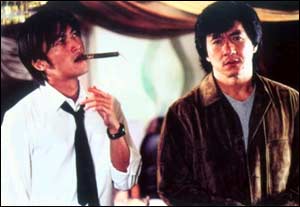 Some have hailed Jackie’s performance in this film as some kind of dramatic breakthrough, but he’s merely throwing himself into “serious acting” with the same play-to-the-rafters brio that would typically be reserved for his fight scenes. So we get to watch him manfully act out his grief, his well-weathered face clenched with despair, or puking in impressive torrents. It’s all respectable without being especially gripping. Fortunately, Tse provides much-needed comic relief, sauntering along like a confidence trickster, content to slip in a few sly jokes and mischievous grins. Compared to Jackie’s lumbering George Foreman, he’s like Muhammad Ali, only more laid back, and much more likeable than he is in his typical moody James Dean mode.
Some have hailed Jackie’s performance in this film as some kind of dramatic breakthrough, but he’s merely throwing himself into “serious acting” with the same play-to-the-rafters brio that would typically be reserved for his fight scenes. So we get to watch him manfully act out his grief, his well-weathered face clenched with despair, or puking in impressive torrents. It’s all respectable without being especially gripping. Fortunately, Tse provides much-needed comic relief, sauntering along like a confidence trickster, content to slip in a few sly jokes and mischievous grins. Compared to Jackie’s lumbering George Foreman, he’s like Muhammad Ali, only more laid back, and much more likeable than he is in his typical moody James Dean mode.
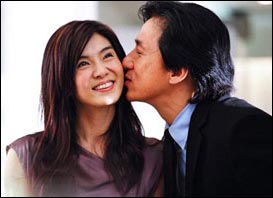 It also helps that Jackie has wisely enlisted director Benny Chan (who helmed his last great Hong Kong feature, Who Am I?) . Chan gives the film a glossy, professional look, and a veneer (you wouldn’t want more than a veneer) of respectability. The plot doesn’t hold up to much scrutiny, but Chan does yeoman’s work in maintaining a sure pace, and playing off the ultra-sincere, determined Jackie against the scruffy youngsters around him. Not that there’s no veterans in the crowd: Taiwan rock star Wu Bai shows up in a cameo, Yu Rong-Guang plays a skeptical fellow inspector and Charlie Yeung, while stuck in the thankless role of “devoted girlfriend in peril,” manages to stamp a bit of her natural impishness on the part.
It also helps that Jackie has wisely enlisted director Benny Chan (who helmed his last great Hong Kong feature, Who Am I?) . Chan gives the film a glossy, professional look, and a veneer (you wouldn’t want more than a veneer) of respectability. The plot doesn’t hold up to much scrutiny, but Chan does yeoman’s work in maintaining a sure pace, and playing off the ultra-sincere, determined Jackie against the scruffy youngsters around him. Not that there’s no veterans in the crowd: Taiwan rock star Wu Bai shows up in a cameo, Yu Rong-Guang plays a skeptical fellow inspector and Charlie Yeung, while stuck in the thankless role of “devoted girlfriend in peril,” manages to stamp a bit of her natural impishness on the part.
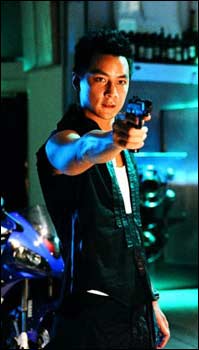 Surprisingly enough, Daniel Wu turns out to be a formidable antagonist, giving the film much of its buzz. His character isn’t complicated, but he’s given a bit more backstory than a villain usually receives, his hatred of cops explained in a few deft strokes. Chan movies aren’t distinguished by their bad guys — usually they’re more misguided than anything else, or just plain pin-up stereotypes — but Wu revels in every sneer and hot-dog manuever, showboating and all but sticking a finger in Chan’s eye during their brief encounters. The palpable tension between them validates the film’s strategy to go old versus young.
Surprisingly enough, Daniel Wu turns out to be a formidable antagonist, giving the film much of its buzz. His character isn’t complicated, but he’s given a bit more backstory than a villain usually receives, his hatred of cops explained in a few deft strokes. Chan movies aren’t distinguished by their bad guys — usually they’re more misguided than anything else, or just plain pin-up stereotypes — but Wu revels in every sneer and hot-dog manuever, showboating and all but sticking a finger in Chan’s eye during their brief encounters. The palpable tension between them validates the film’s strategy to go old versus young.
So how about the action? As a concession to Chan’s age, the big setpieces are downplayed a bit, although there are some corkers in there, including a slip-slide down the face of a skyscraper, a runaway bus routine that harkens affectionately back to the original Police Story, a knock-down fight in a Lego toy shop (Jackie was never one to skimp on the product placement), and a climax atop the Hong Kong Convention Center. There isn’t a single moment to suck the audience’s breath away compared to some of Jackie’s previous exploits, but he brings an old pro’s grace to his tumbles and kicks. Perhaps the film’s most charming moment occurs during the de rigeur “outtakes” that grace the film’s end, in which Jackie leaps from a balcony, grabs hold of a flaming rope, and slides down it, extinguishing it with his hands. The wire that connects him safely to the ceiling during this manuever is plainly visible, a touching admission that it ain’t the old days any more — and you could never imagine the younger, egotistical Jackie willing to reveal such mortality — but you still gasp at the hands-flaming rope bit. Some things don’t change, thankfully.
New Police Story isn’t groundbreaking and it won’t change anyone’s life, but as an introduction to a more modest, autumnal Jackie Chan, it’s a solid entertainment, and proof that while you can’t necessarily teach an old dog new tricks, you can still give him some fresh bones to gnaw on.

